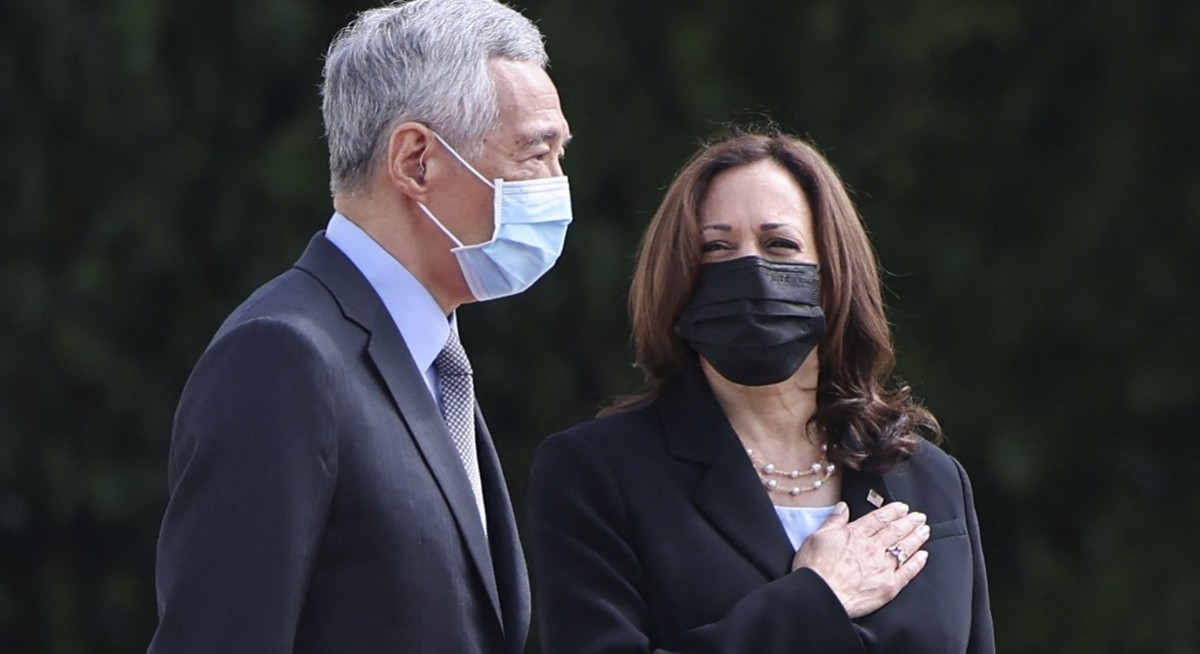The vice president mentioned that the US was focused on successfully completing the evacuation in Afghanistan, where the Taliban have effectively taken control following 20 years of war with America. Singapore Prime Minister Lee Hsien Loong offered to help the US with the evacuation effort.
“Today we are in Singapore to stress and reaffirm our enduring relationship to this country and in this region, and to reinforce a shared vision of a free and open Indo-Pacific region and to reaffirm our mutual interests in peace and stability in Southeast Asia,” Harris said in a joint briefing with Lee.
The US has faced criticism even from its allies for the chaos in Afghanistan as it withdraws troops from the country. President Joe Biden has stood by his decision, and said American intelligence assessments didn’t foresee such a rapid advance by the Taliban and collapse of the Afghan military.
‘Difficult Moments’
Singapore’s Lee emphasized the importance of the US’s role as a “regional guarantor of security and support of prosperity” over the past seven decades in Asia despite “difficult moments” along the way.
“We are watching what’s happening in Afghanistan on the TV screens today, but what will influence perceptions of US resolve and commitment to the region will be what the US does going forward,” Lee said. “How it repositions itself in the region, how it engages its broad range of friends and partners and allies in the region, and how it continues the fight against terrorism.”
On her first full work day in Singapore, Harris and Lee on Monday announced a series of agreements between the nations, including a dialogue to boost cooperation on supply-chain resilience. While it’s not clear yet which industries will participate in the dialogue, Harris is scheduled to meet private sector and government leaders in Singapore on Tuesday to discuss the matter.
During a visit Monday afternoon of Changi Naval Base, Harris thanked US troops still deployed to Afghanistan, while stressing that the Info-Pacific region is the key to America’s future interests, a message she’s likely to expand upon in a speech planned for Tuesday.
“The reason we are here is important, the Indo Pacific is critical to the security and the prosperity of the United States,” she said in remarks to service members aboard the USS Tulsa. “I do believe a big part of the history of the 21st century will be written about this very region where you now serve. And we want to be the ones who are helping to shape and dictate that history. You in your service are going to be the ones who helped shape that history.”
Other US-Singapore agreements included:
US-Singapore climate partnership to develop “high-quality climate standards” and “increase regional ambition” on sustainable finance, among other things.
Expanding collaborating on smart cities, allowing officials to share expertise on topics like water, transporation and energy.
Cybersecurity cooperation with respect to the financial sector, military-to-military engagement and regional capacity building.
Tracking Covid-19 variants and future health security threats in Southeast Asia.
Expanding cooperation for the peaceful exploration of space.
Earlier Monday, Harris and Lee held a restricted meeting to talk candidly, a senior official said, before they opened up the meeting to their staff members. The two leaders also discussed the role of the 10-member Association of Southeast Asian Nations and other regional issues including China and Myanmar, senior administration officials said.
The effort to deepen economic ties doesn’t include talks for new trade agreements, one official said. While trade is part of Harris’s conversations in Asia, negotiations for a framework like the Trans-Pacific Partnership or even a digital trade agreement aren’t on her agenda, the official added.
The vice president made it clear that while the US welcomes stiff competition with Beijing, the Biden administration doesn’t want that competition to veer into conflict, the officials said.
China Looms
Even as China’s growing economic and military might looms large over the meetings this week, US officials have tried to divert attention from countering Beijing and sought to frame the trip as a way to hone in on U.S. engagement in the region and advancing shared interests – without asking countries to choose sides between Washington and Beijing.
Wendy Cutler, a former trade official who’s now vice president at the Asia Society Policy Institute, said that distinction was positive for the relationship’s trajectory.
“While the vice president’s message of ‘We’re back and you can count on us’ may be met with some scepticism during her trip, this can be overcome with the announcement of concrete initiatives with serious follow-through,” she said. “To be successful, any new initiatives must be framed in the affirmative and not as anti-China.”
Harris’s visit to the city-state comes as Singapore’s day-to-day life is largely shut down to contain coronavirus outbreaks. That makes the usual pleasantries associated with such a trip difficult. But at least one customary ceremony took place: Lee named an orchid after Harris – a tradition for foreign guests of honour.
Harris will try to make her mark in the region as the first vice president to visit Vietnam later this week. She is scheduled to depart Singapore for Hanoi on Tuesday afternoon.



